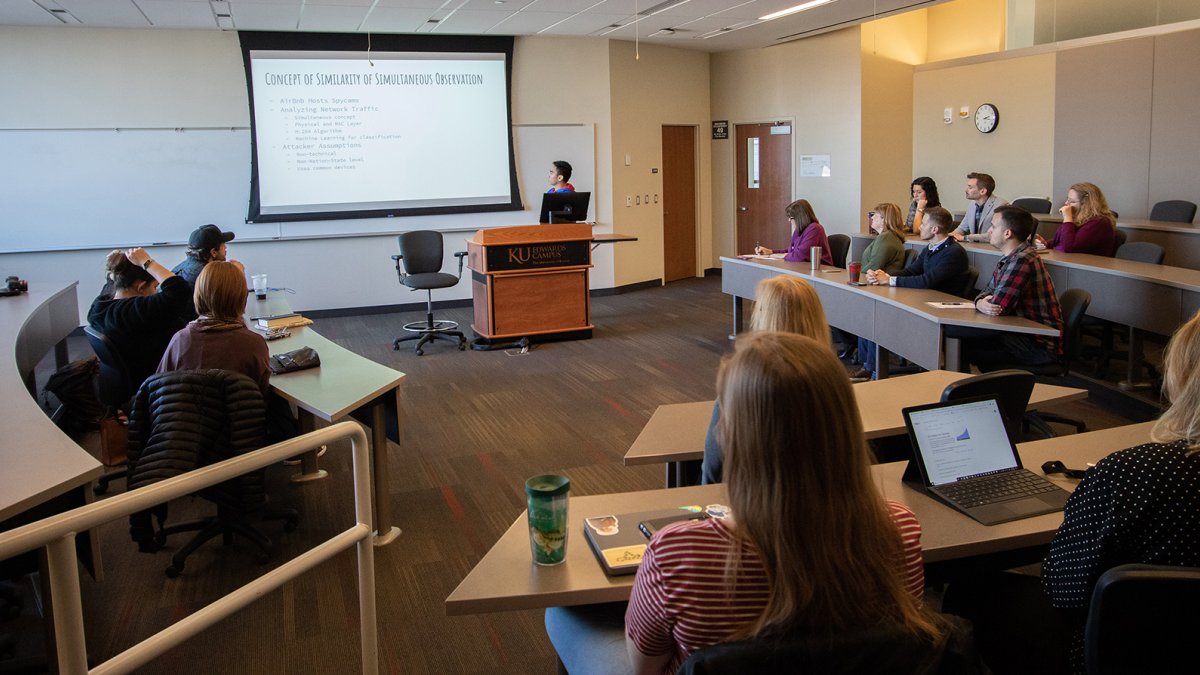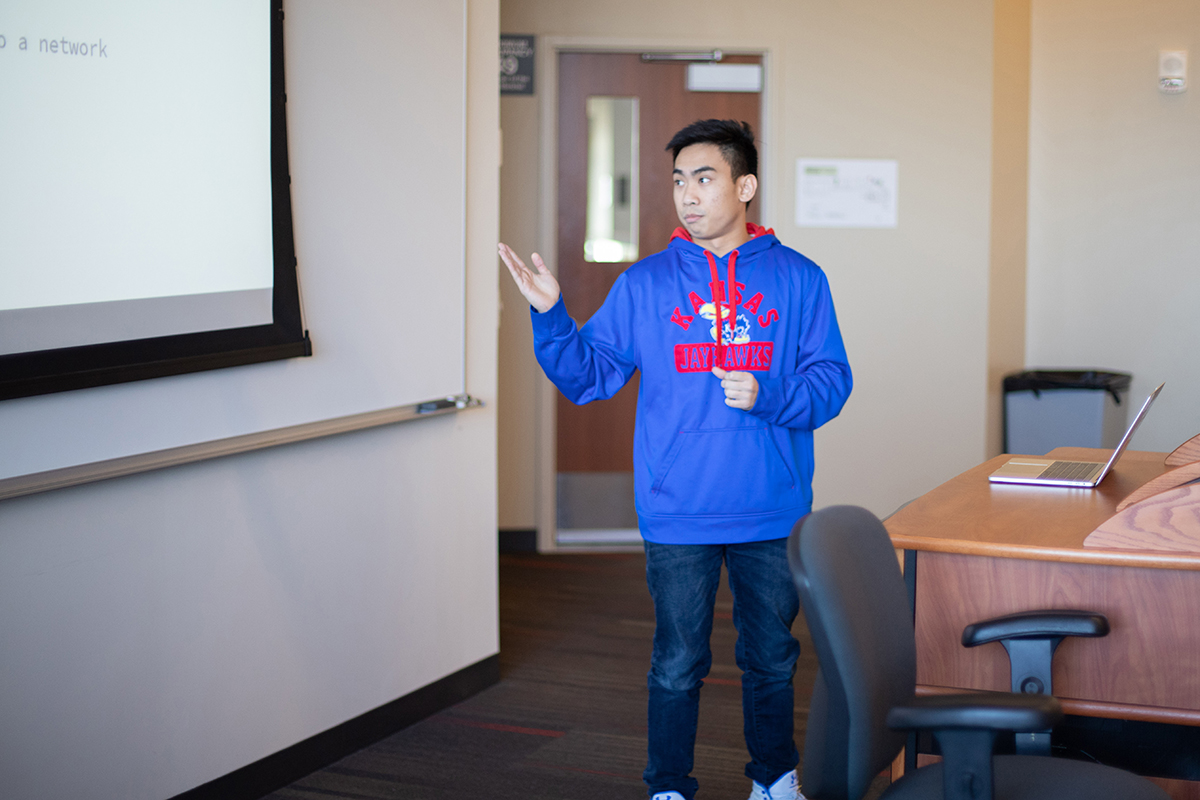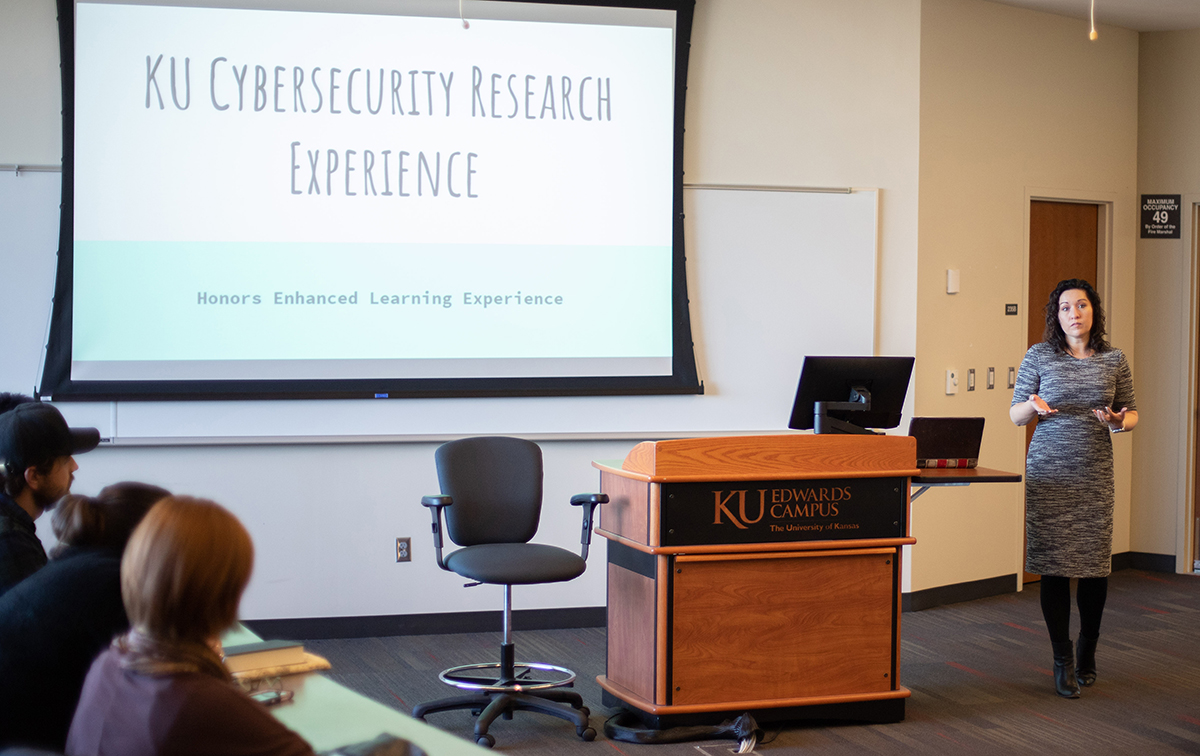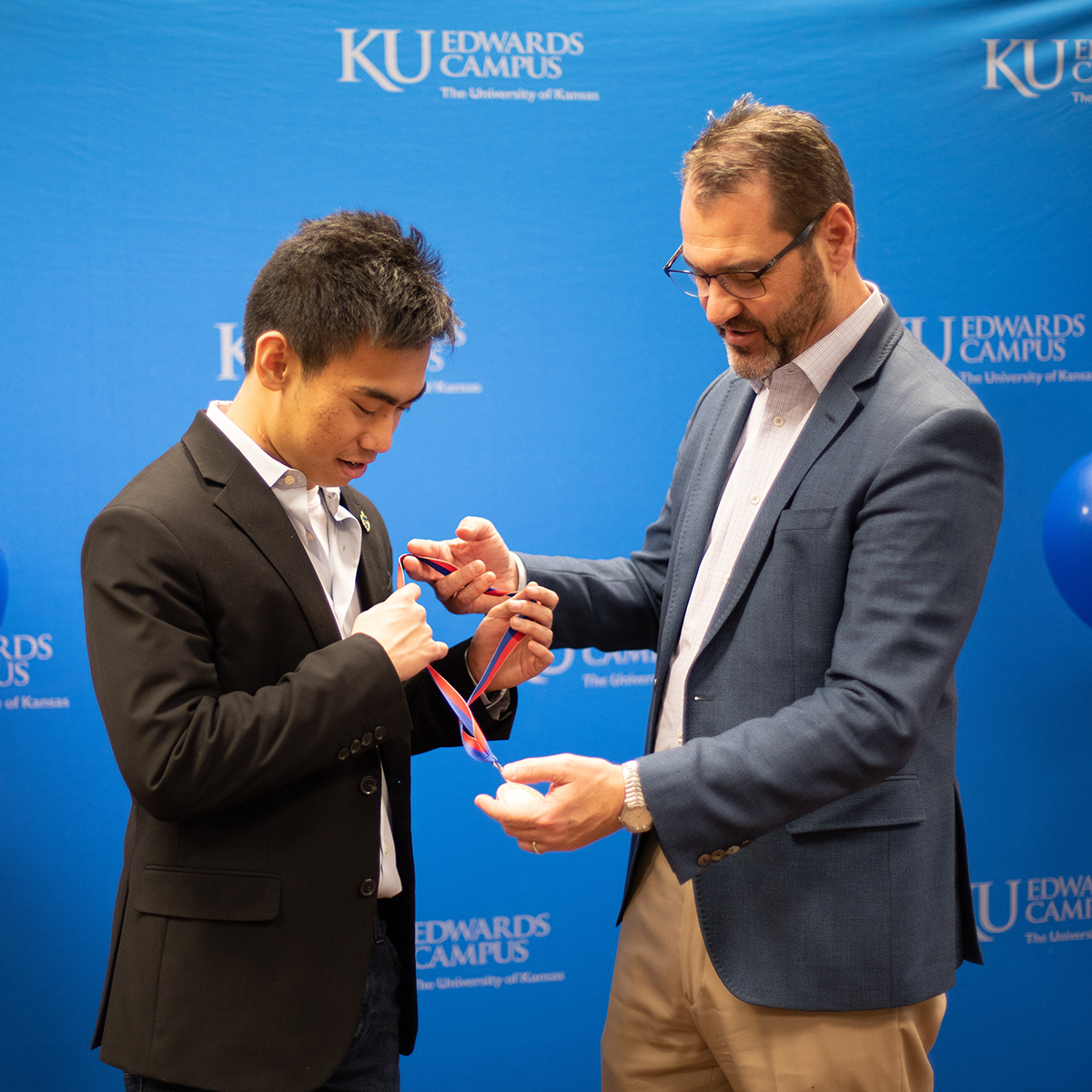Student-initiated experiences hallmark of new KU Edwards honors program

As the first official year of the honors program at KU Edwards Campus (KUEC) winds down, one student showcased how he exemplifies the type of student-initiated qualities the program aims to develop. Senior Elly Richardson will graduate in December with a Bachelor of Science in Information Technology and recently asked to present his final research project to a group of KUEC peers and instructors. Richardson’s research was influenced by studies that focus on how to locate whether a spy camera is operating in a room by using networking tools to identify particular patterns or signals. Richardson was invested in extending previous studies after seeing news reports about such cameras being set up in rental vacation homes in violation of personal privacy.
“Anytime a student wants to initiate some type of project or experience, the

honors program wants to do all we can to support that endeavor,” said Ben Herron, an academic success coach and honors advisor at KUEC. “Student-initiated experiences are a big piece of joining the honors program.”
Richardson graduated with honors from Johnson County Community College before enrolling in KUEC’s information technology degree program. He said with his project he hoped to advance existing research.
“What we were trying to do with the research is instead of just identifying the device type by analyzing the network traffic, we were trying to also identify the hardware within the device type. Like what hard drive does it have, what CPU, what RAM and things like that,” Richardson said. “If we know that, then we could identify different offensive tactics by enumerating device hardware and create ways to defend against them.”
The results of Richardson’s research proved that the techniques they used were not sufficient to accomplish his goal of identifying the hardware, but he still believes it was successful because others will now know that different strategies must be created to accomplish the task. And, he says he will keep looking for answers.
“I am definitely more interested in privacy now, like being able to detect spy cams more efficiently and being able to pinpoint exactly where a spy cam might be located,” Richardson said.
Richardson’s previous internship with the Federal Reserve Bank of Kansas City will turn into a full-time job as a software developer after he graduates in December, but he plans to continue working on cybersecurity initiatives on his own.
Herron said they were happy to recognize Richardson’s work and showcase the type of project that honors students participate in to complete program requirements. The research he conducted was one of four enhanced learning experiences students are required to complete. The program also requires two honors seminars and 18 hours of honors coursework.
Assistant Vice Chancellor and Associate Professor Shannon Portillo said the students in the honors program are held to a high standard.
“I think that many of them are bringing a lot of different experiences that traditional honor students may not have but when it comes to academic aptitude, they’re on par with honor students across the University,” she said.
The honors program at KUEC is part of the nationally recognized University of Kansas Honors Program, with a twist.

“We’ve designed KUEC’s honors program specifically for transfer or nontraditional students to get the most value out of their education as possible through experiences and deeper learning than they would normally get, and we support their efforts to go above and beyond in whatever direction they want to take that,” Herron said.
Portillo agreed.
“Our goal is to make sure that transfer students who are the best and the brightest have a way to continue that in a really well-rounded R-1 [nationally-recognized research university] experience,” she said.
The deeper learning that research brings is what Richardson said he has loved most about his honors experience.
“I love the knowledge I have gained from my honors projects that I would not have had otherwise,” he said. “For example, I wrote a research paper about the Cherokee Freedman [African-American men and women who were formerly slaves of the Cherokee before and after removal to Indian Territory and the American Civil War] and I turned my senior project mobile app into a desktop version.”
Richardson said he originally applied because he thought having the honors program on his resume might help him find more jobs, but it’s done so much more.
“It has been a great personal achievement,” he said. “It has boosted my self-confidence. I know I am able to complete tasks beyond my previous expectations. It has helped me with time management, mainly because I had to take these extra courses and still manage to cram it in along with all my other commitments. And it’s also helped me get scholarships.”
Another honors program student juggling multiple commitments is junior Daniel Hester, a psychology major who plans to attend law school after earning his undergraduate degree. In his first semester of the honors program, Hester says he has especially enjoyed taking the capstone class, which is focused around conducting and analyzing research methods.
“Getting more exposure to research my last two years in college is making me more of an objective student who can think for himself and learning how to read literature, understand statistics and become a better critical thinker,” Hester said.
Hester encourages others to take initiative and apply for the program.
“Nothing in life that’s ever worth doing is free or easy,” he said. “The honors program is challenging — especially with a wife and a full-time job, there are a lot of pitfalls that I could fall into — but I think it helped keep me focused. You have more people you're interacting with — a lot more professors and different industry leaders — and I think that helped me maintain a good vision for what I'm doing in school as opposed to being more lackadaisical like I am just going to school to get my degree.”
All students are encouraged to apply for the KU Edwards Honors Program by completing the online application by March 30 for the fall semester and Oct. 30 for the spring semester. Students can have already started at KUEC or be about to start. The application consists of a resume, two-page personal statement and transcripts. Herron said there is no minimum grade point average to apply.
“We evaluate each application and consider individual circumstances,” he said. “We do look for a strong GPA, but we also look at their success over time. We don’t want to punish students for something that might have happened in their past and now they are in a different place.”
Working on building relationships with colleges such as JCCC, Kansas City Kansas Community College and Metropolitan Community Colleges is key for developing an awareness about the honors program and increasing applications, according to Portillo.
“We’re working to make sure that students know when they're in community

college that they should be taking advantage of all the opportunities there — making sure they're exposing themselves to rigorous courses, that they're getting to know the faculty, and that they have a really great understanding of the path into our honors program,” Portillo said.
Herron said the honors program at KUEC will continue to evolve as they look for students to drive its future and convince others to take advantage of the opportunity.
“The hard work is worth it because hard work actually produces good fruit — a good outcome at the end,” Hester said. “When you're around people that are high-functioning it makes you want to be high-functioning. It makes you want to strive to be a better student, person, individual, community member and participant, and hopefully leader.”
Learn more about the Bachelor of Information Technology and the Honors Program at KU Edwards Campus.





